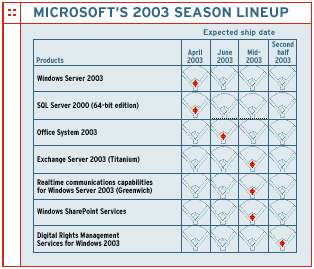Here's The Pitch
Microsoft is swinging for the fences with a series of product launches this year that together represent one of the single-largest annual product rollouts in the history of the software industry.
Starting with Windows Server 2003 and the subsequent launch of Office 2003 and related iWave products, the software giant is expected to unveil more than a dozen new or enhanced products between now and the end of the year. That means that within the next few months, the company is refreshing nearly all of its business infrastructure and desktop productivity software, no bush-league play.
The rollout is "much bigger than any of the releases we've had since Windows 95 and Office 95," Jeff Raikes, group vice president of Microsoft's Information Worker Business Group, told CRN last week. "I think once people see what they can do with Office 2003, Outlook, XML capabilities and information rights management, [they'll understand] it's a pretty exciting story," he said.
Exciting? Perhaps. Challenging? No doubt. Microsoft solution provider partners, which sell roughly 80 percent of the company's products going out to small and midsize customers, say the rollout gives them plenty of products they'll have to field in the coming months.
"It is certainly a lot of stuff at one time," said Frank Cullen, principal at Blackstone and Cullen, Atlanta.
Some solution providers are clearly excited. "This whole iWave is huge for us because it gets the .Net platform out there and will let us take business solutions to the next level," said Andy Vabulas, president of IBIS, another Atlanta-based solution provider.
Others wonder if partners, already struggling in a difficult economy, have been able to invest the time and money needed to get ready for such an extensive array of new products.
The upcoming lineup is certainly impressive. It includes the server operating system and a 64-bit version of SQL Server 2000, both of which are set to launch April 24 and were released to manufacturing last Friday. And Visual Studio .Net 2003, also set to launch April 24, will be released to manufacturing "soon," Microsoft said. Those products will be followed in June by the Office System 2003 onslaught, which is expected to include two new offerings,OneNote and InfoPath,as well as upgrades to Word, Excel, PowerPoint, Outlook, Project, FrontPage, Publisher and Visio. Those offerings, plus the upcoming SharePoint Portal Server 2003, constitute what Microsoft internally calls the iWave products.
Also expected within months are Windows Rights Management Services, which add digital rights management (DRM) capabilities to the server, and Real-Time Communications (RTC) services, also for the server. Within the same time frame, the company is expected to introduce a new version of Exchange Server, followed by a revision of Small Business Server.
One longtime New York-area Microsoft partner said he believes Microsoft hasn't done a good enough job preparing the channel. "I don't think they've spent a lot of time getting the channel ready for what I am calling 'the defense of Redmond.' Partners are not going to spend very limited resources on Microsoft product evangelism. We did that on Active Directory, Windows 2000 and .Net," he said.

\
'I think once people see what they can do with Office 2003, Outlook, XML capabilities and information rights management, [they'll understand] it's a pretty exciting story.' -- Jeff Raikes, group vice president of Microsoft's Information Worker Business Group
Indeed, last year's .Net brand bait and switch was something of a disaster, most industry watchers say. Microsoft started out slapping the .Net label on nearly every project, only to pull back when it succeeded mostly in confusing the market,something even Microsoft Chairman Bill Gates conceded last summer.
Integrators also say that bad feelings linger over last year's licensing changes, which were viewed by many as price hikes.
However, other partners say Microsoft has been remarkably proactive in getting them what they need. They point to the many partner "airlifts" and Partner Advisory Council meetings in Redmond during which they have been briefed on product and go-to-market plans.
"I believe Microsoft has done a great job at getting us trained and ready," said Rand Morimoto, president of Convergent Computing, an Oakland, Calif., solution provider. Convergent staff members have already attended training sessions in Redmond and have had access to a dozen local training sessions, he said.
Morimoto said that those opportunities, combined with the availability of beta software, labs and demos over the past six months, have helped his company understand "business-focused issues like product positioning, how they plan to market, what messages they will send out and how we can get involved in co-marketing sponsorship."
For example, in prepping partners for Exchange Server 2003, aka Titanium, Microsoft is hosting a partner marketing day in early April for 600 attendees, as well as an Exchange Partner Airlift a month later for in-depth technical briefings. And the TechEd conference in Dallas in early June is expected to offer additional partner training, according to Microsoft.
Ironically, one factor playing in Microsoft's favor is the fact that Windows Server 2003,once known as Windows .Net Server,has been a long time coming.
The original launch was slated for late 2001, which means partners have been hearing about this technology literally for years now. In addition, a lot of the functionality is evolutionary, said Richard Warren, a Winchester, Va.-based IT consultant. "Folks are used to the directory. Now they'll need to get used to tools to manage the directories and govern policy," he said.

Microsoft also insists that its partner-centric, go-to-market message is being heard at all levels within the company. Even product-focused executives such as Bill Veghte, corporate vice president of the Windows Server Group, said he spends as much time with partners as he does with customers. Microsoft's full disclosure of beta plans and releases to manufacturing (RTMs) sometimes ruffled feathers internally as details inevitably leaked beyond the partner community. "It sort of gets tiring seeing yet another headline about slipped RTMs, but from a partner perspective, they want to know what's going on," Veghte told CRN. "It's all about transparency."
Still, Microsoft's communication has not allayed all concerns. "I'm more worried about what comes next [after Windows Server 2003]," said Warren. "These products are coming in three waves. First [is] the server operating system. The second wave, depending on whether Raikes can keep his schedule, will be Office System 2003, or else all the follow-on server upgrades for Win 2003 [DRM and RTC] stuff, as well as Titanium."
Microsoft's plan to offer tight integration among these offerings is both a blessing and a curse, solution providers said. "I think it's true [that the products] work together better [because they're integrated], but the flip side is when you change things in one, it may be hard to keep them working together," Warren said.
And solution providers say the company's collaboration technology plans remain fuzzy. "There are a lot of piece-parts in realtime collaboration and communication, some of which are going into the server, some in the client,and it's not at all clear yet what's really going on," said one partner who asked not to be named.
A New York-area partner who also requested anonymity said it is difficult to take employees out of working engagements to get them trained in new products. "Classes held during normal business hours make it very tough to commit to training on products that have not shipped nor have committed sales engagements," he said.
Clearly, partners with the wherewithal to send employees for training have a long-term advantage. So do those with long and close ties to the vendor both at the field and corporate levels.
To maximize their money-making opportunities, some partners will likely have to concentrate on what they do best. Microsoft, after all, now has software running from the bowels of server operating systems and an upcoming 64-bit database all the way up to fairly specialized business applications atop the stack.
Allison Watson, vice president of Microsoft's Worldwide Partners Group, said that the ability to focus will be the key to success for many channel partners. "They have to figure out what they're good at and what they need to partner on, and grab a learning path for those technologies and solutions," she told CRN. "If a partner thinks they map to us 100 percent, we have to educate and get them to pick an area and focus."
As this model develops, Watson said she foresees a continuing trend in which partners team up with other partners. A prime example of this is Infinity Info Systems, a New York-based solution provider that specializes in CRM implementations and works with Microsoft CRM and some competitors' products. Infinity partners with two other infrastructure solution providers to lay the technological groundwork of its deployments.
"Our partners do the infrastructure audit and upgrade Exchange [Server] if needed," said Infinity President Yacov Wrocherinsky. "We could do the whole thing, but why? On our side, we concentrate on the CRM."
A small number of other partners, however, say that as the Microsoft software stack extends from the server infrastructure to customer-facing vertical applications, they will be able to capitalize on that full range. IBIS' Vabulas said the relatively recent availability of Microsoft back-office financial and ERP applications via its purchases of Great Plains Software and Navision will give small and midsize business customers, which now tend to run Microsoft operating systems and desktop applications, "a compelling reason" to go all-Microsoft. "The midmarket sees the value in an integrated stack," he said.
But above all, one big question remains: In such a difficult economic environment, will customers open their wallets? Microsoft's Jeff Raikes acknowledged that even though he thinks the new product rollout represents an "exciting story" for solution providers to present to prospective customers, that's just his view. As to whether IT buyers will be willing to pony up for all of these new products, "the market will measure that," he said.